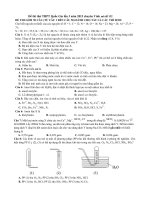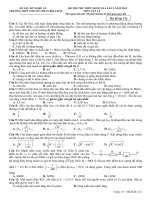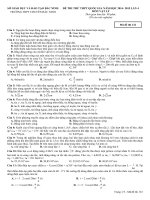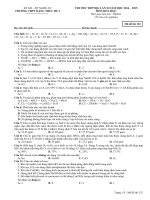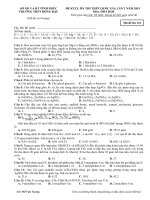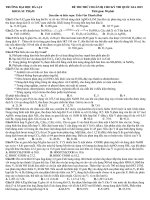ĐỀ THI THỬ THPT QUỐC GIA, LẦN 1 NĂM 2015
Bạn đang xem bản rút gọn của tài liệu. Xem và tải ngay bản đầy đủ của tài liệu tại đây (161.04 KB, 11 trang )
TRƯỜNG ĐẠI HỌC VINH
TRƯỜNG THPT CHUYÊN
ĐỀ THI THỬ THPT QUỐC GIA, LẦN 1 NĂM 2015
MÔN TIẾNG ANH (Thời gian làm bài: 90 phút)
Mã đề thi 132
Họ, tên thí sinh: Số báo danh:
I. PHẦN TRẮC NGHIỆM : TỪ QUESTION 1 ĐẾN QUESTION 64 (8 điểm)
Read the following passage and mark the letter A, B, C or D on your answer sheet to indicate the
correct answer to each of the following questions.
Books which give instructions on how to do things are very popular in the United States today.
Thousands of these How-to books are useful. In fact, there are about four thousand books with titles that
begin with the words “How to”. One book may tell you how to earn more money. Another may tell you
how to save or spend it and another may explain how to give your money away.
Many How-to books give advice on careers. They tell you how to choose a career and how to
succeed in it. If you fail, however, you can buy the book “ How to Turn Failure into Success”. If you
would like to become very rich, you can buy the book “How to Make a Millionaire”. If you never make
any money at all, you may need a book called “How to Live on Nothing”.
One of the most popular types of books is one that helps you with personal problems. If you want
to have a better love of life, you can read “How to Succeed in Love every Minute of Your Life”. If you
are tired of books on happiness, you may prefer books which give step-by-step instructions on how to
redecorate or enlarge a house.
Why have How-to books become so popular? Probably because life has become so complex.
Today people have far more free time to use, more choices to make, and more problems to solve. How-to
books help people deal with modern life.
Question 1: What is the passage mainly about?
A. How-to books
B. How to make a millionaire
C. How to turn failure into success
D. How to succeed in love every minute of your life
Question 2: The word “it” in paragraph 2 refers to________
A. advice B. How-to books C. career D. instruction
Question 3: Which of the following is NOT the type of books giving information on careers?
A. “How to Turn Failure into Success”
B. “How to Succeed in Love every Minute of Your Life”.
C. “How to Make a Millionaire”.
D. “How to Live on Nothing”
Question 4: The word “step-by-step” in paragraph 3 is closest in meaning to_______
A. little by little B. gradually C. slower and slower D. A and B
Question 5: It can be inferred from the passage that________
A. Today people are more bored with the modern life.
B. Modern life is more difficult to deal with.
C. Today people are more interested in modern life.
D. Today people have fewer choices to make.
Read the following passage and mark the letter A, B, C or D on your answer sheet to indicate the
correct answer to each of the following questions
The National Automobile Show in New York has been one of the top auto shows in the United
States since 1900. On November 3 of that year, about 8,000 people looked over the “horseless carriages.”
It was the opening day and the first opportunity for the automobile industry to show off its wares to a
large crowd; however, the black-tie audience treated the occasion more as a social affair than as a sales
extravaganza. It was also on the first day of this show that William McKinley became the first U.S.
president to ride in a car.
The automobile was not invented in the United States. That distinction belongs to Germany.
Nikolaus Otto built the first practical internal-combustion engine there in 1876. Then, German engineer
Karl Benz built what are regarded as the first modern automobiles in the mid-1880s. But the United States
pioneered the merchandising of the automobile. The auto show proved to be an effective means of getting
the public excited about automotive products.
By happenstance, the number of people at the first New York show equaled the entire car
population of the United States at that time. In 1900, 10 million bicycles and an unknown number of
horse-drawn carriages provided the prime means of personal transportation. Only about 4,000 cars were
assembled in the United States in 1900, and only a quarter of those were gasoline powered. The rest ran
on steam or electricity.
After viewing the cars made by forty car makers, the show’s audience favored electric cars
because they were quiet. The risk of a boiler explosion turned people away from steamers, and the
gasoline-powered cars produced smelly fumes. The Duryea Motor Wagon Company, which launched the
American auto industry in 1895, offered a fragrant additive designed to mask the smells of the naphtha
that it burned. Many of the 1900 models were cumbersome—the Gasmobile, the Franklin, and the Orient,
for example, steered with a tiller like a boat instead of with a steering wheel. None of them was equipped
with an automatic starter.
These early model cars were practically handmade and were not very dependable. They were
basically toys of the well-to-do. In fact, Woodrow Wilson, then a professor at Princeton University and
later President of the United States, predicted that automobiles would cause conflict between the wealthy
and the poor. However, among the exhibitors at the 1900 show was a young engineer named Henry Ford.
But before the end of the decade, he would revolutionize the automobile industry with his Model T Ford.
The Model T, first produced in 1909, featured a standardized design and a streamlined method of
production—the assembly line. Its lower costs made it available to the mass market.
Cars at the 1900 show ranged in price from $1,000 to $1,500, or roughly $14,000 to $21,000 in
today’s prices. By 1913, the Model T was selling for less than $300, and soon the price would drop even
further. “I will build cars for the multitudes,” Ford said, and he kept his promise.
Question 6: The passage implies that the audience viewed the 1900 National Automobile Show
primarily as a(n)___________
A. formal social occasion.
B. chance to buy automobiles at low prices.
C. opportunity to learn how to drive.
D. chance to invest in one of thirty-two automobile manufacturers.
Question 7: According to the passage, who developed the first modern car?
A. Karl Benz B. Nikolaus Otto C. William McKinley D. Henry Ford
Question 8: Approximately how many cars were there in the United States in 1900?
A. 4,000 B. 8,000 C. 10 million D. An unknown number
Question 9: The phrase “by happenstance ” in paragraph 3 is closest in meaning to________.
A. Generally B. For example C. Coincidentally D. By design
Question 10: Approximately how many of the cars assembled in the year 1900 were gasoline powered?
A. 32 B. 1,000 C. 2,000 D. 4,000
Question 11: Which of the following is closest in meaning to the word “launched” in paragraph 4
_______.
A. designed B. anticipated C. joined D. initiated
Question 12: The purpose of the “additive” mentioned in paragraph 4 was to___________.
A. increase the speed of cars. B. hide strong smells.
C. make engines run more efficiently. D. make cars look better.
Question 13: Which of the following is NOT mentioned in the passage as steering with a tiller rather
than with a steering wheel?
A. A Franklin B. A Gasmobile C. An Orient D. A Duryea
Question 14: It is clear from the passage that the early cars___________.
A. were more formal. B. were more spectacular.
C. involved less expensive cars. D. involved fewer manufacturers.
Question 15: What was the highest price asked for a car at the 1900 National Automobile Show in the
dollars of that time?
A. $300 B. $1,500 C. $14,000 D. $21,000
Read the following passage and mark the letter A, B, C, or D on your answer sheet to indicate the
correct word(s) for each of the following blanks.
VINCENT VAN GOGH
Vincent Van Gogh is a famous painter from the 19th century. Van Gogh’s paintings are sold at very
high prices (16)________ many collectors want his paintings. But unfortunately, when he was (17) __, he
did not have a happy life.
Van Gogh was from a poor family in Holland and lived (18) ________ his life at home. He lived a
rather sad and (19) ________life. He drew things that he could see (20) ________around the quiet town
of his parents’ home or outside his window. This is why he painted things (21) ________the sky, his
room and even himself.
Van Gogh once cut off his own ear after drawing a picture of himself. He cut it off to (22)
________the person that said the ear in Van Gogh’s painting was not correct. It was very
(23)________him to do such a thing.
Van Gogh was also (24) ________ a crazy man. He really (25) ________become crazy, and was
sent to a mental hospital. Sadly, he killed himself when he was just 37.
Question 16: A. for B. because C. although D. because of
Question 17: A. living B. live C. alive D. lively
Question 18: A. most of B. the most of C. almost of D. mostly
Question 19: A. alone B. lonely C. loneliness D. lone
Question 20: A. both B. neither C. either D. all
Question 21: A. like B. alike C. likely D. as such
Question 22: A. prove B. reveal C. illustrate D. show
Question 23: A. unfortunate that B. unfortunate to C. unfortunate D. unfortunate of
Question 24: A. referred B. known C. named D. called
Question 25: A. did B. couldn’t C. does D. didn’t
Mark the letter A, B, C, or D on your answer sheet to indicate the word that differs from the rest in the
position of the main stress in each of the following questions.
Question 26: A. refuse B. musician C. history D. mechanic
Question 27: A. museum B. destroy C. threatened D. economy
Question 28: A. communicate B. computer C. comfortable D. flamingo
Mark the letter A, B, C, or D on your answer sheet to show the underlined part that needs correction in
each of the following questions.
Question 29: There were too many books on the shelves that I didn’t know which one to choose.
A B C D
Question 30: Rita enjoyed to be able to meet several Parliament members during her holiday.
A B C D
Question 31: Nutritionists recommend that foods from each of the four basic groups be eaten on a
A B
regularly daily basis.
C D
Question 32: Before TV, the common man seldom never had the opportunity to see and hear his
A B C
leaders express their views.
D
Question 33: All of the book were very interesting. I am surprised you didn’t like it.
A B C D
Mark the letter A, B, C, or D on your answer sheet to indicate the word whose underlined part is
pronounced differently from that of the rest in each of the following questions.
Question 34: A. cooks B. opens C. wants D. stops
Question 35: A. decided B. needed C. looked D. started
Mark the letter A, B, C, or D on your answer sheet to indicate the correct answer to each of the
following questions.
Question 36: ________Paul realize that he was on the wrong flight.
A. No sooner had the plane taken off than B. It was not until the plane had taken off that
C. Only after the plane had taken off D. Not until the plane had taken off did
Question 37: The sky was grey and cloudy._________, we went to the beach.
A. However B. In spite of C. even though D. Consequently
Question 38: I don’t mind _________ much homework.
A. did B. to do C. do D. doing
Question 39: Nadine: “__________”. Monica: “Good luck”
A. I don’t like rock music. B. How do you do!
C. Have a nice day! D. I’m taking a test this afternoon.
Question 40: I can’t walk in these high-heeled boots. I keep________.
A. falling off B. falling back C. falling over D. falling out
Question 41: Old people are often looked ________ by their children when they get older.
A. for B. up C. after D. into
Question 42: Education in Vietnam has improved since the government started a programme of
educational ___________.
A. experience B. reform C. system D. resources
Question 43: The plan was developed _________by a team of experts.
A. system B. systematical C. systemized D. systematically
Question 44: All of the food ________sold by the time we arrived at the restaurant.
A. has been B. was being C. was D. had been
Question 45: It was not until 1915 _________ the cinema became an industry.
A. what B. that C. when D. how
Question 46: Yuri Gagarin was the first person ________into space.
A. travelling B. has travelled C. to travel D. travelled
Question 47: Like everyone else, Sue has her________of course but on the whole, she’s quite satisfied
with life.
A. ups and downs B. ins and outs C. safe and sound D. odds and ends
Question 48: The Prime Minister congratulated the team _______winning the match.
A. for B. in C. on D. into
Question 49: He came when I _______ the film “Man from the star”
A. has watched B. was watching C. watched D. am watching
Question 50: Peter _________football when he was younger.
A. used to playing B. is used to playing C. is used to play D. used to play
Question 51: ________ with the size of the whole earth, the highest mountains do not seem high at all.
A. A comparison B. Compare them C. If you compare D. When compared
Question 52: Charles: “Do you mind if I smoke?” Lisa: “ _________”
A. Yes, I don’t mind B. No, I don’t think so C. Yes, go ahead D. No, go right ahead
Question 53: Bill asked Tom _________.
A. where is he going B. where he is going C. where he was going D. where was he going
Question 54: This is Sen village _________Uncle Ho was born.
A. where B. what C. which D. who
Question 55: Linda: “I enjoy watching films in the evening.” Mary: “________”
A. I don’t B. So do I C. I am, too D. No, I am not
Question 56: Medical researchers are continually looking for ways to control,________ and cure diseases.
A. prevented B. to prevent C. prevent D. preventing
Question 57: It’s a big country with a_________population.
A. rare B. sparse C. scarce D. few
Question 58: You will have to _________if you want to pass the final exam.
A. pull up your socks B. work miracles C. take the trouble D. keep your hand in
Question 59: If I were you, I _________ that English course.
A. will take B. would take C. take D. took
Question 60: They have considered all the 100 applications, ________seem suitable for the position.
A. none of them B. none of these C. none of which D. none of whom
Mark the letter A, B, C, or D on your answer sheet to indicate the word or phrase that is CLOSEST in
meaning to the underlined part in each of the following questions.
Question 61: A wedding is a meaningful event.
A. important B. unimportant C. sad D. sorrowful
Question 62: He devised a computer game and sold it to Atari.
A. played B. bought C. invented D. divided
Question 63: The Rev. Dr. Martin Luther King fought to put an end to racial segregation in the United
States.
A. integration B. education C. torture D. separation
Question 64: She was a devoted teacher. She spent most of her time teaching and taking care of her
students.
A. honest B. dedicated C. lazy D. polite
II. PHẦN TỰ LUẬN (2 điểm)
A. Rewrite the following sentences in such a way that they mean almost the same as those printed
before them. (0,5 điểm)
Question 1: People say that Jenny lived in Texas, America for 8 years.
Jenny
Question 2: “ You are wearing a beautiful dress today!” , Susan said to Mary.
Susan paid
Question 3: It was such a boring documentary film that she fell asleep.
The documentary film
Question 4: “I am sorry for coming late”, said Alice to her teacher.
Alice apologized
Question 5: What the politician was saying fell on deaf ears last night.
No one
B. Write a paragraph about the free time activity you like best. (1,5 điểm)
You should write at least 80 words.
THE END
ĐÁP ÁN
I. PHẦN TRẮC NGHIỆM: TỪ QUESTION 1 ĐẾN QUESTION 64 (0,125 x 64 câu = 8 điểm )
1. A
2. C
3. B
4. D
5. B
6. A
7. A
8. B
9. C
10. B
11. D
12. B
13. D
14. B
15. B
16. B
17. C
18. A
19. B
20. C
21. A
22. D
23. D
24. D
25. A
26. C
27. C
28. C
29. B
30. A
31. C
32. A
33. B
34. B
35. C
36. D
37. A
38. D
39. D
40. C
41. C
42. B
43. D
44. D
45. B
46. C
47. A
48. C
49. B
50. D
51. D
52. D
53. C
54. A
55. B
56. C
57. B
58. A
59. B
60. C
61. A
62. C
63. D
64. B
II. PHẦN TỰ LUẬN (2 điểm)
A. Rewriting (0,1 x 5 = 0,5 điểm)
Question 1: Jenny is said to have lived in Texas, America for 8years.
Question 2: Susan paid Mary a compliment on her (beautiful) dress (that day).
Question 3: The documentary film was so boring that she fell asleep.
Question 4: Alice apologized (to her teacher) for coming/having coming late.
Question 5: No one listened to what the politician was saying last night.
(No one paid attention to /took notice of what the politician was saying last night).
B. Write a paragraph about the free time activity you like best. (1,5 điểm)
Criteria for marking:
1. Đáp ứng được yêu cầu của đề bài: Đúng dạng là đoạn văn (chứ không phải bài luận), độ dài (ít nhất là
80 từ), miêu tả về hoạt động ưa thích nhất vào thời gian rỗi (ví dụ: xem tivi, nghe nhạc…)
2. Sự liên kết và mạch lạc (cấu trúc của một đoạn văn: câu chủ đề, câu phát triển ý, câu kết , sử dụng
phương tiện từ liên kết giữa các ý với nhau….)
3. Từ vựng: đa dạng, tránh sự lặp đi, lặp lại, đúng ngữ cảnh; chính tả, sự kết hợp giữa các từ.
4. Ngữ pháp: đa dạng cấu trúc ngữ pháp, đúng thời, sự hòa hợp chủ - vị….
